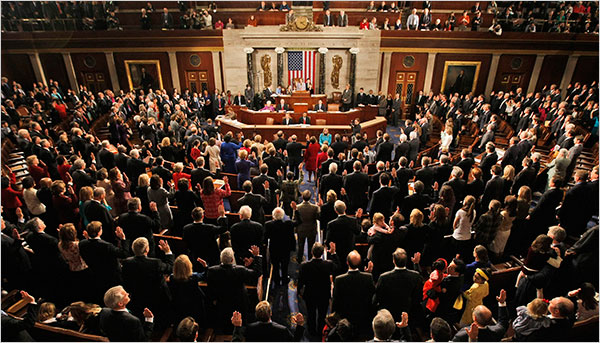Leading members of Congress this week unveiled a broad package of spending and tax legislation that would avert a U.S. government shutdown and lift the 40-year-old ban on crude oil exports.
House Speaker Paul Ryan reported to fellow Republicans in a closed-door meeting Tuesday night in Washington that leaders had reached a deal pairing a $1.1 trillion spending bill with a separate measure to revive a series of expired tax breaks.
Importantly, the spending portion of the bill would fund the government through September 2016, thereby averting threats of a government shutdown throughout 2016 and eliminate the need for temporary spending measures during the year.
The proposed tax legislation was posted on the House of Representatives website late Tuesday evening, and the spending measure followed it early Wednesday. Senate Democrats were reportedly still awaiting some final language before announcing whether they will agree to the proposals.
The bill mixes a range of Republican-backed policy provisions, such as preventing the Securities and Exchange Commission from requiring publicly-traded companies to disclose their political contributions, with a broad variety of tax breaks for industry groups from healthcare to broadcasting.
Government funding expired at the end of the day on December 16, 2015. To address this problem, an additional stopgap spending bill will be required until all parties have an opportunity to vote on the complete package. Final consideration of the proposed legislation is expected before Christmas.
Industry Sector Beneficiaries
As noted, industry sectors were among the beneficiaries in the massive bill. The natural resources industries were given a major boost by virtue of a provision within the proposed legislation lifting the four-decades-old ban on crude oil exports.
United States oil producers, including Continental Resources Inc., Pioneer Natural Resources Co. and ConocoPhillips, have, for some time, been lobbying to repeal a provision within the law that blocks exports of most raw, unprocessed crude, but did not restrict foreign sales of gasoline, diesel and other refined petroleum products.
The tax measure would extend a $1 per gallon biodiesel credit and other benefits for renewable energy sources – tradeoffs negotiated by Democrats in exchange for lifting the oil export ban. Wind developers would get at least five more years to claim a production tax credit, while the amount of that credit gradually scales down. Commercial and residential solar developers would also be able to claim an investment tax credit for at least five more years, though it would gradually phase down from covering 30% of qualifying costs today to 10%.
Tax Credits
The tax-extension measure would make a number of tax breaks permanent, including those for companies’ research and development, and those that allow small business owners to write off tangible assets during the first year after purchase rather than depreciating them over an extended number of years. Also to be made permanent are an enhanced child tax credit and earned income tax credit, as well as tax breaks for charitable giving and schoolteachers’ expenses.
Other Provisions
The legislation would suspend two taxes intended to fund the Affordable Care Act – the “Cadillac tax” on high-cost health insurance plans and a 2.3% on medical devices through 2017.
The plan provides health funds, including bonus payments to doctors and hospitals that use electronic health records.
The legislation does not provide a “bailout” to financially troubled Puerto Rico. Puerto Rico had wanted the Legislature to include a provision in the spending bill to grant Puerto Rican agencies the ability to file for bankruptcy under Chapter 9.
The spending measure would scale back a program that allows visa-free entry to the U.S. for citizens of about three dozen countries, including much of Europe. People who have traveled recently to Iraq, Syria or other countries deemed to have significant terrorist activity would have to go through the normal visa process.
Final Tradeoffs in Negotiation
To finalize the agreement between the two parties, Republicans gave up on their bid to require people to provide a Social Security number to take a child tax credit as Democrats contended such a requirement would disproportionately affect immigrants.
The legislation also would ratify an International Monetary Fund (IMF) plan approved in 2010 to increase the voting share of emerging economies and double the amount of permanent funding available to the Washington-based fund. Republican opposition to the plan has prevented the IMF from implementing the changes set forth in the 2010 plan.
Concluding Remarks
The extension of critical tax benefits, again, in the nick of time, will certainly reduce income tax liabilities of our clients on the upcoming tax season. It is unfortunate, however, that the two bills, now likely to be approved and enacted the week of December 21st require eleventh-hour negotiation. An extender’s package had been introduced as early as late spring or early summer. The outcome of the process is, once more, a serious delay by Congress causing business owners to pull back on capital investment and other strategic initiatives.
Grossman Yanak & Ford LLP will, as always, prepare a summary of the new laws as they are enacted and get that information posted as soon as possible.
In the meantime, should you have any questions, please contact Bob Grossman or Don Johnston at 412.338.9300.








